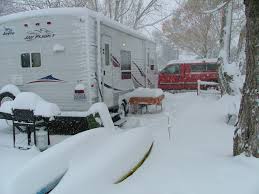We are in the midst of winter now and looking forward to spring. However, don’t let the cold weather deter you from enjoying your RV in the wintertime. There are many wonderful and beautiful things to do and see during the winter months. Think snow skiing, ice fishing, riding snowmobiles, ice skating and wintry wonderland scenery and so much more. Is it then any wonder that more and more people are using their RV’s throughout the entire year? I belong to several RV forums and sites where I see a great number of people requesting information and tips about using RV’s during the winter, in cold temperature areas. A short blog article such as this one cannot do the subject a great deal of justice, however, you must also keep in mind that if your RV is not adequately prepared and protected against inclement weather such as freezing temperatures, you could end up with a not so pleasant experience.
In this regard, I would like to offer some tips and suggestions that you might find helpful in protecting your RV in case you want to hit the road during the winter months when it’s much colder. Mind bear that there are no guarantees that your RV will be 100 percent free from frozen plumbing lines, hot water tanks and holding tanks. What I am going to discuss here are tips and suggestions for short-term winter trips and camping in your RV.
The first thing to consider is how to protect your RV while camping in cold weather conditions. Equally important is to understand how to protect yourself and your fellow campers in cold weather.
If your plans include RV’ing when the temperature falls below freezing, and you have water in your plumbing system, the water could easily and quickly freeze, causing a burst pipe… or worse, which could result in costly repairs, not to mention the frustration of ruining your trip. The best way to combat this is insure your plumbing system is winterized prior to heading out. Winterizing your RV is much easier than it sounds, especially to newer RV’ers and the cost is minimal.
I have winterized my RV twice this winter, because when I begin to feel the effects of cabin fever at home during the winter, I just pack a few things and I’m on the road in just a couple of hours.
Here is a video that might help you to better understand the basics of winterizing your RV.
Once you winterize your RV, you can still use your bathroom facilities as you travel. I carry one-gallon jugs of water to use in the toilet. My holding tanks are heated, so I have no worries of frozen tanks. If your holding tanks are not heated, you can put some (RV)** antifreeze in your tanks to prevent freezing of the tank contents.
Add the RV antifreeze through the toilet for the black water holding tank and pour more down the shower or tub drain for the gray water tank. The antifreeze will also protect the shower or tub P-trap which is usually located below floor level. Check your owner’s manual for the amount of antifreeze to use; based on the size of your tanks. Depending on the brand of antifreeze you get, you may find directions on the label as to amount to use. Keep in mind too, that the more waste water accumulated, the more the antifreeze is diluted, thereby requiring more antifreeze.
Be aware of your holding tanks as waste accumulates in freezing conditions and don’t let them fill completely before dumping them. This will lessen the chance of your tanks freezing, resulting in damage and costly repairs. I take plenty of bottled water along for drinking and cooking, brushing teeth and washing up when my RV is winterized. If you have pets, make sure to carry extra water in gallon jugs filled from your home tap for them as well as what was discussed above. Extra water comes in handy when your RV is winterized.
When stopping for periods of time, try to find a sunny spot that ideally will also have a structure or tree line near-by to protect the RV from cold winds. This same tip applies when you arrive at your destination. If camping at a site with electric and fresh-water hook-ups, I de-winterize my plumbing system. I can then use all systems. All the water lines in my RV are above floor level, in a heated space, so I have no concerns about my water system freezing as long as I maintain heat inside my RV. If I keep my water heater filled with water and water heater turned on, there are no worries of it freezing. My water heater operates off LP gas and /or electricity, so it’s fully automatic and I do not concern myself too much with it.
Speaking of water, it’s a good idea to know where all your plumbing is located, where the drain plugs are, where the valves are and the hot water tank bypass valve is, etc. You should become very familiar with the uniqueness of your RV’s plumbing system. Some RV’s have water lines below the floor level, in areas not close to heat. In cases such as this, your lines are subject to freezing. If you have a fresh water connection where you are parked and are hooked to that water source, an option could be to leave the water dripping which keeps the water moving, which in turn, decreases the possibility of water lines freezing. Heat tape is another option. Heat tape can be purchased at most building supply stores or RV centers. Just insure that the tape you purchase is suitable for the type plumbing system in your RV.
In extreme cold conditions, the possibility exists that the fresh-water source where you camp, has been turned off for the winter and the connections are not operable. The fresh water tank on some RV’s is located above floor level in a heated area which affords the owners the ability to use their fresh water tanks without fear of them freezing.
If shower facilities exist in the park/campground where you are and are open during the winter, it might be a good idea to use those which keeps your gray water tanks from filling so quickly.
In this regard, if might be in your best interest to keep your RV winterized and just use the campgrounds facilities.
** RV antifreeze is pink in color and is not toxic like the antifreeze that one would protect their vehicles with. RV Antifreeze can be purchased at RV centers and big box stores. I purchased mine at Walmart for less than $3.00 per gallon. It can also be purchased at Amazon.
Travel Happy,
Bill




